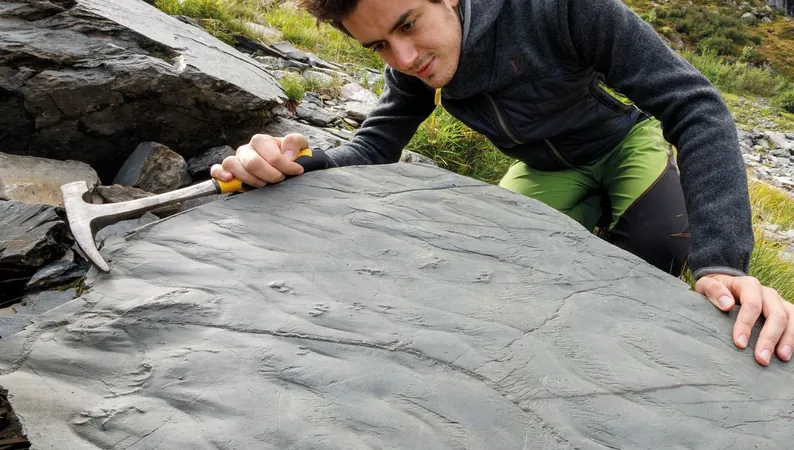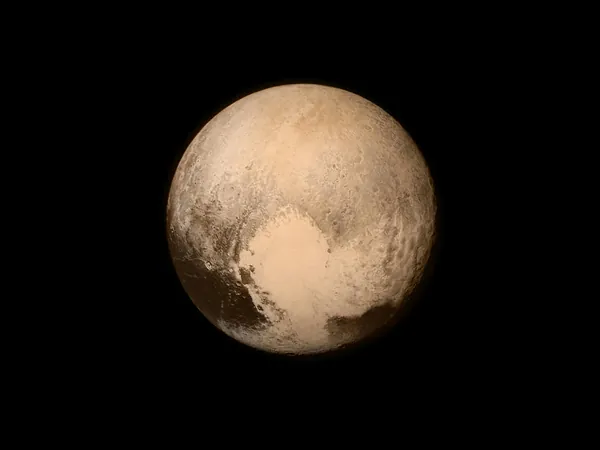
Historic Fossil Discovery in the Alps Reveals 280-Million-Year-Old Ecosystem Predating Dinosaurs!
2024-11-15
Author: Emily
Historic Fossil Discovery in the Alps Reveals 280-Million-Year-Old Ecosystem Predating Dinosaurs!
In an unprecedented find, fossilized remains of a complete prehistoric ecosystem, including footprints of long-extinct animals, have been discovered by chance in the Italian Alps. These fossils, dating back an astonishing 280 million years to the Permian period, represent life on Earth long before the rise of dinosaurs in the subsequent Triassic period.
This remarkable discovery was made by Claudia Steffensen during a hike in the scenic Val d’Ambria area of Piateda, located at an impressive altitude of 1,700 meters (5,577 feet). Excited by her finding, she promptly shared her images with a friend, nature photographer Elio Della Ferrera, who reached out to scientists at the Natural History Museum of Milan. Their inquiries eventually led to confirmation by specialists at the University of Pavia and the Leibniz Institute for Research on Evolution and Biodiversity in Berlin, who recognized the significance of these specimens.
The fossil beds contain footprints from at least five different species, showcasing the incredible diversity of life from that era. Among these traces are those of tetrapods—ancient reptiles and amphibians—as well as invertebrates like insects and arthropods. According to Cristiano Dal Sasso, a palaeontologist at the Natural History Museum of Milan, the footprints of some of the larger animals suggest they could have reached lengths of 2-3 meters.
Lorenzo Marchetti from the Leibniz Institute elaborated on the discovery, explaining that the fine grain of the sediment allowed for extraordinarily detailed preservation, including imprints of fingertips and skin textures. Beyond animal footprints, the fossil layers contain precious plant remnants—leaves, stem fragments, and seeds—along with impressions of ancient wave ripples and raindrops that fell onto the mud.
This extraordinary collection of fossils is a result of geological activity that took place millions of years ago. The Alps emerged as the African and Eurasian tectonic plates collided, forcing layers of sediment from the ancient Tethys Sea upward into the mountain range we see today. The preserved ecosystem lay undisturbed for eons until the recent thawing of glaciers and snow caps, exacerbated by climate change, unveiled these ancient relics.
Interestingly, researchers noted parallels between the past climatic conditions and present-day global warming, which has been driven by human activities. Both periods have been marked by heightened greenhouse effects—then attributed to massive volcanic eruptions—that led to significant environmental changes, including the melting of polar ice caps. Stefano Rossi from the Superintendency of Archaeology highlighted how these ancient changes favored the dominance of reptiles over amphibians and contributed to the extinction of various other species.
"This discovery underscores how much we can learn from our planet’s history," Rossi said, emphasizing the lessons in resilience and adaptation offered by these ancient ecosystems. As new findings continue to emerge from the melting ice, scientists remain committed to uncovering the secrets held within the Earth’s layers, offering crucial insights into both our past and our future.
Conclusion
Stay tuned as we delve deeper into this groundbreaking discovery and its implications for our understanding of prehistoric life!









 Brasil (PT)
Brasil (PT)
 Canada (EN)
Canada (EN)
 Chile (ES)
Chile (ES)
 España (ES)
España (ES)
 France (FR)
France (FR)
 Hong Kong (EN)
Hong Kong (EN)
 Italia (IT)
Italia (IT)
 日本 (JA)
日本 (JA)
 Magyarország (HU)
Magyarország (HU)
 Norge (NO)
Norge (NO)
 Polska (PL)
Polska (PL)
 Schweiz (DE)
Schweiz (DE)
 Singapore (EN)
Singapore (EN)
 Sverige (SV)
Sverige (SV)
 Suomi (FI)
Suomi (FI)
 Türkiye (TR)
Türkiye (TR)